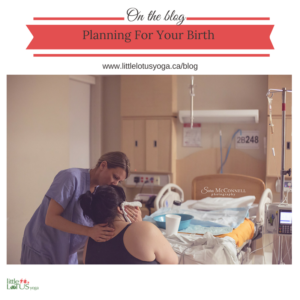Unless you’re a “fly by the seat of your pants” kind of person you probably do a lot of planning for your vacations. Maybe you spend time browsing discount travel websites and reading reviews. You may chat with friends or family about their experience travelling to a particular destination. Perhaps you take time to learn the local language or map out day trips. 
Think of your birth like a special trip – who do you want to “travel” this childbirth journey with? What sorts of things will you pack in your bags? What kinds of things do you want to have happen when you get there?
How much planning you do is totally dependent on the type of person you are. Some women and their partners need to a do a lot of planning for childbirth; they want to think of every eventuality, and plan out how they will respond. Other couples are happy to take a more relaxed approach, and are usually people who desire less information in order to feel comfortable.
However you choose to plan for your birth, it’s important not to be too rigid. Like any trip you take, you may encounter challenges along the way. Going in with unrealistic expectations is a surefire way to experience disappointment. No one knows how their birth will unfold, but we do hold the cards when it comes to how we will respond.
Some important things you may want to consider when planning for your birth:
- What have your past experiences been with the healthcare system and childbirth? Do you have any particular fears (or phobias) that healthcare providers need to be aware of?
- What are you going to pack when traveling to your birth place? Or if you’re staying home, what supplies do you need to have on hand?
- How would you like to cope with pain? Do you lean more towards natural coping strategies (e.g. bath, massage) or are you happy to use pharmaceuticals if needed? It’s OK to fall somewhere in the middle – some women will plan one thing, but be open to changing their minds.
- Who do you want to have at your birth? Will your partner have a hands-on role, and will you be inviting other non-medical support people (e.g. doula or family member) to join you?
- How do you feel about visitors? Will you want to limit the number of people in the room? If this is the case, you will need to instruct your healthcare provider that you would like to avoid having medical students there for practice or observation. Family members should be informed of your wishes.
- In the event of an unexpected outcome (e.g. cesarean section) do you have any special requests? Some women ask to have skin-to-skin (STS) time with their babies in the operating room, while others request that their partners do STS or accompany the baby to the neonatal intensive care unit (NICU) if there are additional healthcare needs.
- Are there any special wishes you have for the immediate postpartum period? Some parents will refuse baby’s first bath, opting to do it at home. Others feel strongly about avoiding formula supplementation. Make sure your wishes are known to medical staff at the hospital or birth centre.
By planning for childbirth you are taking an active role in medical decision making. It helps to become aware of the benefits and risks of more common interventions, and decide beforehand how you will handle unexpected outcomes. Planning also helps couples feel prepared and less anxious about the big day.
As with any trip, a travel plan does not always dictate how things will turn out. But being open and flexible to change will make the journey a lot more fun. Remember, we all get to the same “destination” in the end.

Leave a Reply